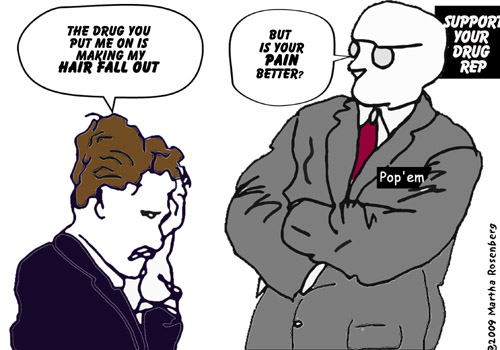There was a day when it seemed like everyone was on antidepressant “happy pills” like Prozac®, Paxil® and Zoloft®. But then the pendulum began to swing. Patients objected to the weight gain and feelings of not being “themselves,” sexual side effects and the withdrawal symptoms. There were even reports and warnings about suicide and other “neuropsychiatric” effects.
Now, WebMD, the gigantic, pro-pill web site whose original partner was Eli Lilly, is doing damage control for SSRI antidepressants. New articles, sounding like they’re from crib makers or cantaloupe growers, urge patients not to panic or quit taking their pills just because of things they read.
Don’t believe all the hooey about antidepressants turning “you into a zombie,” ruining your sex life or costing too much, says an article called Fears and Facts About Antidepressants on WedMD. And don’t be impatient! “If the first antidepressant medication doesn’t help, the second or third often will. Most people eventually find one that works for them.” Ka-ching. Don’t listen to all that suicide talk either! “Switching to a different antidepressant may help,” say the damage control articles.
Is your fear of becoming a drug lifer keep you from antidepressants, asks another WebMD article called What’s Stopping You from Seeing a Doctor About Depression? “If you do need a medication, it most likely won’t be for life,” says the article. Just until the patent runs out?
Do you think you can ignore your depression and it will go away? “Waiting for depression to simply pass can be harmful,” because “depression that goes untreated may become more severe,” say the WebMD articles—rewriting medical practice itself since depression has never been a progressive disease but is actually self-limiting.
The important thing, say the articles, is to never stop your meds. “Stopping medication abruptly may . . . cause depression to return,” and can cause side effects, say the articles. Worse—“prescription abandonment”—people who discover what a drug costs and leave it at the pharmacy or quit drugs because of their effects—costs Pharma lots of money! Pharma even has programs now that send Big Brother nurses to people’s homes, through their pharmacies, to make sure people are taking their meds.
One antidepressant with a big PR problem is Eli Lilly’s Cymbalta®. It’s linked to the deaths of Traci Johnson, a healthy 19-year-old who hanged herself on the Lilly campus during clinical trials in 2004, and Carol Anne Gotbaum, daughter-in-law of former New York City Public Advocate Betsy Gotbaum who died in police custody at Phoenix’s Sky Harbor airport in 2007.
Cymbalta is noted in the scientific literature for producing suicidal side effects in people with no mental health history. A 37-year-old man, described in the Journal of Clinical Psychopharmacology, with a stable marriage and employment and no history of mental problems tried to kill himself with carbon monoxide two months after taking Cymbalta for back pain. A 63-year-old man, also with no mental health history, became suicidal on the drug after two weeks.
“There is an emergence of suicidality in apparently nonsuicidal patients after starting or increasing Duloxetine [Cymbalta] reads an article in Clinical Practice and Epidemiology in Mental Health.”
But now, Cymbalta is being promoted as a pain drug of choice like it’s not a repurposed antidepressant with antidepressant side effects. Last year it was approved for chronic musculoskeletal pain, including discomfort from osteoarthritis and chronic lower back pain, and it was already approved for fibromyalgia and diabetic nerve pain.
A Cymbalta ad in October’s New England Journal of Medicine, says, “Today a non-NSAID [non- aspirin or ibuprofen] non-narcotic, once daily analgesic FDA approved for 3 indications across 4 different chronic pain conditions can be found in 1 med.” Sounds as safe asVioxx.
Martha Rosenberg’s first book, “Born With A Junk Food Deficiency: How Flaks, Quacks and Hacks Pimp The Public Health,” will be published by Prometheus Books in 2012.



